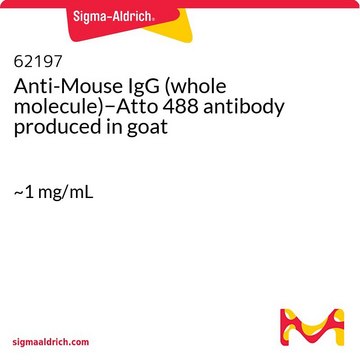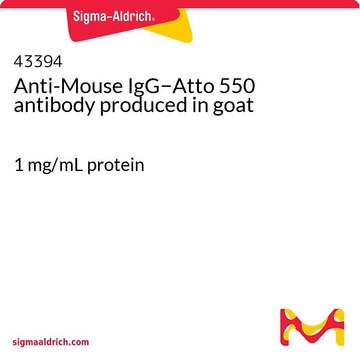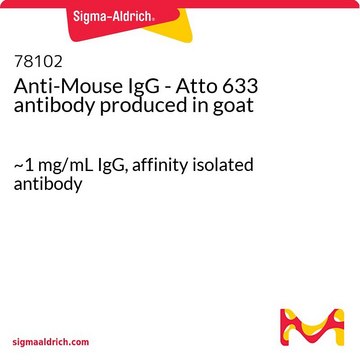41176
Anti-Rabbit IgG - Atto 633 antibody produced in goat
1 mg/mL IgG
Synonyme(s) :
Atto 633 [goat-Anti-rabbit IgG]
About This Item
Produits recommandés
Source biologique
goat
Niveau de qualité
Conjugué
Atto 633 conjugate
Forme d'anticorps
affinity isolated antibody
Type de produit anticorps
secondary antibodies
Clone
polyclonal
Contient
50% glycerol as stabilizer
Espèces réactives
rabbit
Concentration
1 mg/mL IgG
Technique(s)
immunohistochemistry: 1:200
Fluorescence
λex 636 nm; λem 650 nm in PBS
Température de stockage
−20°C
Modification post-traductionnelle de la cible
unmodified
Description générale
Immunogène
Application
Remarque sur l'analyse
Informations légales
Clause de non-responsabilité
Vous ne trouvez pas le bon produit ?
Essayez notre Outil de sélection de produits.
Produit(s) apparenté(s)
Code de la classe de stockage
10 - Combustible liquids
Classe de danger pour l'eau (WGK)
WGK 3
Point d'éclair (°F)
Not applicable
Point d'éclair (°C)
Not applicable
Équipement de protection individuelle
Eyeshields, Gloves
Faites votre choix parmi les versions les plus récentes :
Déjà en possession de ce produit ?
Retrouvez la documentation relative aux produits que vous avez récemment achetés dans la Bibliothèque de documents.
Articles
Immunoblotting (Western blot transfer) is a common technique in modern proteomics research.
Notre équipe de scientifiques dispose d'une expérience dans tous les secteurs de la recherche, notamment en sciences de la vie, science des matériaux, synthèse chimique, chromatographie, analyse et dans de nombreux autres domaines..
Contacter notre Service technique








